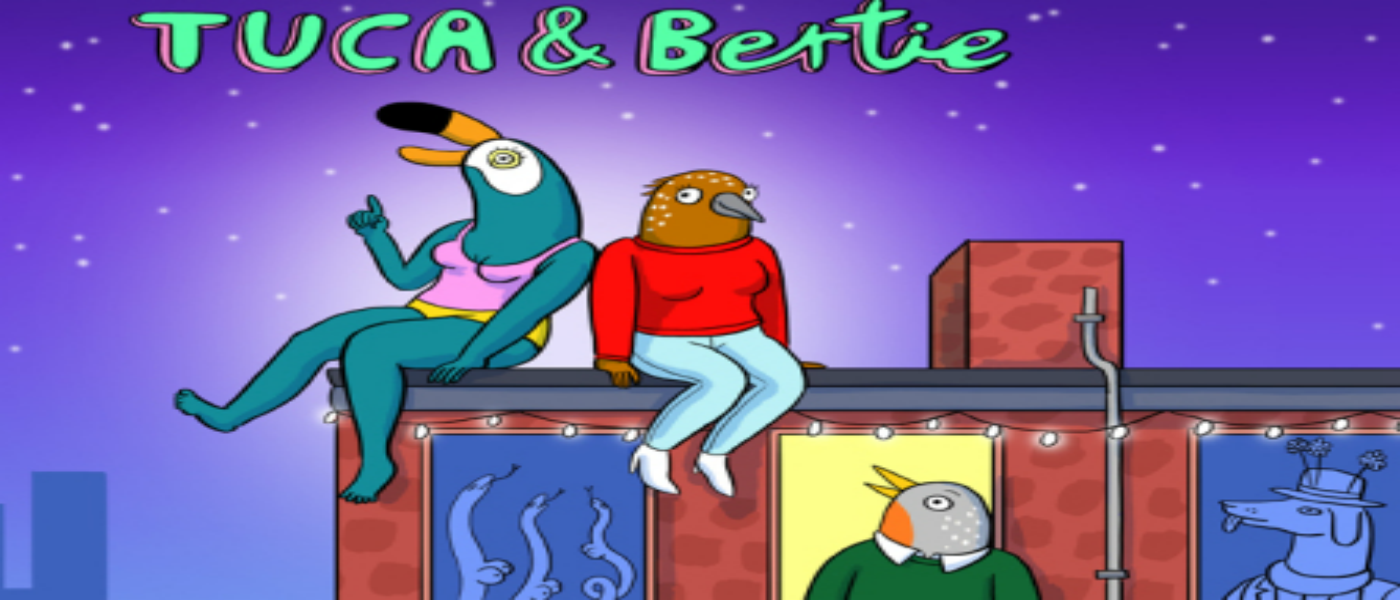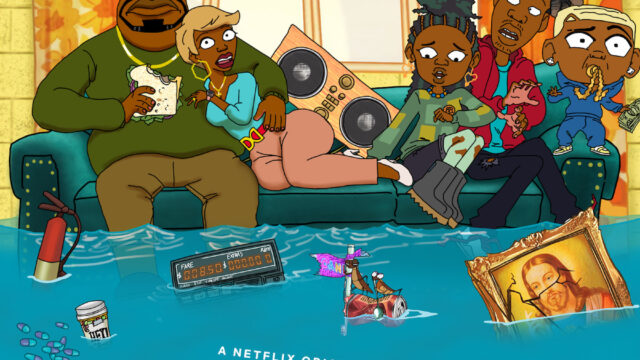Tuca & Bertie: Feminism Thriving in an Absurd Universe
The new series Tuca & Bertie shares many similarities to Netflix’s long-running powerhouse, BoJack Horseman.
This comes as no surprise seeing as the show’s creator, Lisa Hanawalt, was a producer and artistic designer on BoJack from day one, a large chunk of the animation crew works on both series, and they air on the same streaming service.
However, even before Tuca & Bertie premiered, Hanawalt made a point of stating that the two creations do not take place in the same universe. Her surreal and cartoonish world is a sharp contrast to the harsh reality explored in BoJack’s Hollywoo.
Instead of a faithful recreation of the real world, Tuca and Bertie’s misadventures occur where giant snakes or snails act as subway trains. And animals, humans, and even plants side-scroll through busy city streets as if they live inside a videogame.
While BoJack uses anthropomorphic animals to give its human audience a buffer from weightier themes such as alcoholism, depression, and suicidal thoughts, Tuca & Bertie goes a step beyond and enters an absurdist realm in order to challenge longstanding and topical issues that women face every day.
Is this buffer really needed? We don’t believe it’s absolutely necessary because the show offers much more than any given week’s hot feminist take. The writers never shy away from controversy, and yet they still make it a priority to depict poignant moments of friendship, realistic relationship woes, and non-judgmental party culture. Tuca (Tiffany Haddish) survives on her winning personality, winks, smiles, and a barrage of part-time jobs and is masterfully balanced by how Bertie (Ali Wong) is terrorized by the men in her professional life and questions her life choices at every turn.
The absurdist world Hanawalt designed is an artistic choice that allows the creative team to explore topics such as sexual harassment, discrimination in the workplace, and rape culture without coming across as preachy or falling into the “very special episode” trope. In part, the show succeeds because its loose rules are used to both strengthen the plot and alleviate some of the more cumbersome content.
Since a large portion of the audience has at some point worked in an office setting, the events in the second episode, “The Promotion,” are likely to resonate. The story depicts Bertie being sexually harassed, and while she isn’t quiet about it, her complaints aren’t taken seriously by her boss or HR representative. Sadly, this is true to life because at many companies management and Human Resources are there to protect the corporation and not the employees.
This would’ve come across as a pretty grim episode if Tuca wasn’t recently hired as a temp and inserts herself into the situation. The surrealist world not only allows Tuca to speak up for her timid friend, but it also gives her full run of the office and dominion over the other temps (who she refers to as Templates), until everything works out and Tuca is free to abandon her post.
And while nobody is properly punished for their infractions—sans a slap on the wrist for the biggest offender—Bertie feels better because she wins the day and locks down the promotion she’s been coveting. This is a conclusion that would be considered unacceptable, yet inevitable, in the real world (or a real-adjacent world like Hollywoo), but is instead viewed as a supreme victory in the land of Tuca and Bertie.
The harasser (John Early)—a literal cock named Dirk—isn’t viewed as the predator he should be because of the lackadaisical attitude expressed by almost everyone in the office, including Bertie once she reclaims her power and self-worth. Tuca and Bertie don’t seem to mind bad things or actors existing in their purview once they conquer the initial fear or intimidation. Tuca even starts a band with her sex bugs—that’s pubic lice to you—once they stop being as a personal irritant.
Bertie’s biggest challenge arises toward the end of the season when the penguin who was supposed to be helping her achieve her dream of becoming a pastry chef goes beyond being inappropriate in the workplace. Once they call him on his illicit behavior he goes out his way to blackball Bertie throughout the entire dessert industry—oh yeah, that’s some tragic stuff. And even though we don’t see Pastry Pete (Reggie Watts) jobless and ruined by season’s end, our girls dish him up a hefty helping of homespun justice that you must witness to fully appreciate.
Tuca & Bertie is a treat for both BoJack Horseman fans and anyone who enjoys well-written adult animation. The characters and their creators don’t play by the typical rules and are greatly rewarded for their efforts. Granted, the charm of this program could and likely would work in a more grounded setting, but the formula truly thrives under a no-holds-barred narrative.
Read our review for Tuca and Bertie Season One



























Hi Ashley, thank you so much for reading and we love the feedback. Note that on that day we had 14th posts go up and only ten posts show on the front page, so it's possible the preview had already been archived by the time you got to it. One recommendation would be to add our RSS feed to your favorite news aggregator service like Feedly, this way you get all of the latest posts!